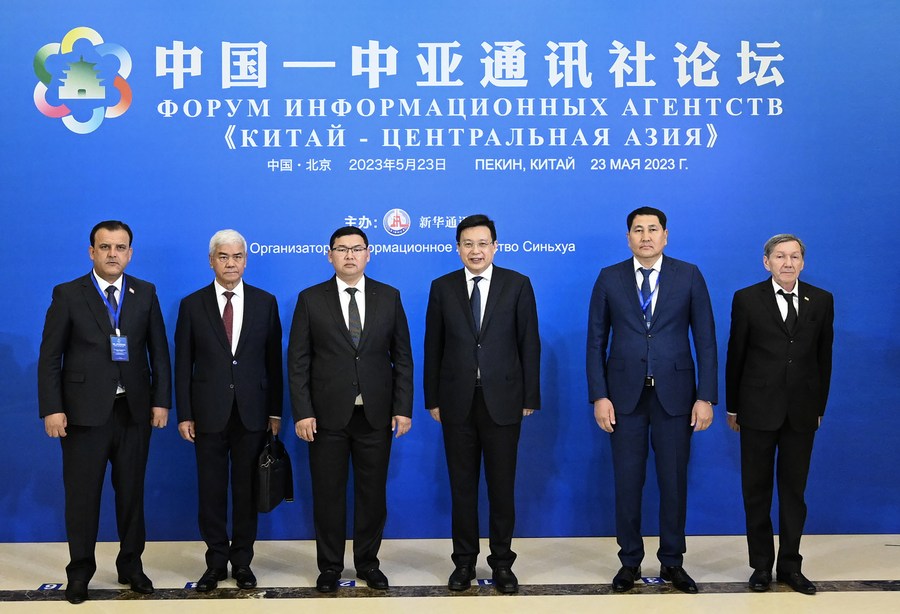Media outlets pledge to contribute to building China-Central Asia community with shared future

The China-Central Asia News Agency Forum is held in Beijing, capital of China, May 23, 2023. (Xinhua/Xie Huanchi)
BEIJING, May 24 (Xinhua) -- Heads and representatives of media outlets from China and five Central Asian countries on Tuesday gathered at a media forum in Beijing, where they had in-depth discussions and reached broad consensus on strengthening media cooperation to promote the building of a China-Central Asia community with a shared future.
The China-Central Asia News Agency Forum, one of the achievements of the recently concluded China-Central Asia Summit, was initiated and hosted by China's Xinhua News Agency.
The participating media outlets included the Television and Radio Complex of the President of the Republic of Kazakhstan, Kabar News Agency of Kyrgyzstan, Khovar News Agency of Tajikistan, Media Turkmen News Agency and Uzbekistan National News Agency.
Speaking at the forum, Fu Hua, president of Xinhua News Agency, said that the China-Central Asia Summit has established a platform for cooperation between the two sides and opened up new prospects, bearing milestone significance in the history of the development of relations between China and Central Asian countries.
The relations between the two sides are marching toward a new era, which presents new opportunities for media cooperation among the six countries, Fu said.
Xinhua is ready to work with media outlets in Central Asian countries to expand exchanges, deepen collaboration, and enhance understanding and mutual trust, he said.
Fu called for greater efforts in news reporting in various fields to inject new momentum for relations between China and Central Asian countries, and bring positivity to promoting exchanges and mutual learning among civilizations as well as world peace and development.
Foreign attendees at the forum spoke highly of the China-Central Asia Summit. Tlegen Abishev, deputy head of the Television and Radio Complex of the President of the Republic of Kazakhstan, said the summit has opened a new chapter in cooperation between Central Asian countries and China.
The various documents and cooperation agreements passed during the summit have outlined a new blueprint for comprehensive and in-depth cooperation between the two sides in the future, said Mederbek Shermetaliev, head of the Kabar News Agency of Kyrgyzstan.
During the forum, the Russian version of a think tank report on Xi Jinping's economic thought was released for audiences from Central Asian countries. The video version of the report was also unveiled.
As an important part of Xi Jinping Thought on Socialism with Chinese Characteristics for a New Era, Xi Jinping's economic thought is formed through the Communist Party of China's unremitting efforts to explore the path of socialist economic development, said Lyu Yansong, editor-in-chief of Xinhua.
The economic thought is the key to understanding the theory and practice of Chinese modernization, Lyu said, adding that the release of the Russian-version report will provide authoritative interpretation for further understanding of the thought.
"The report allows us to gain a deeper understanding of the essence of Xi Jinping's economic thought, which is scientific and forward-looking," said Bekdurdy Amansaryyev, head of the Media Turkmen News Agency.
Subhiddin Shamsiddinzoda, head of the Khovar News Agency of Tajikistan, said the report can help him gain a deeper understanding of Xi Jinping's economic thought, and learn from China's development experience and apply it to the development of his own country.
The Belt and Road Initiative (BRI) was also highlighted by participants at the forum, as this year marks the tenth year since President Xi put forward the initiative.
They believed that over the past decade, the initiative has created new opportunities for the development of countries around the world, including China and Central Asian countries. As the initiative is being carried forward, various countries' demand for economic information has been growing even stronger.
Abdusaid Kuchimov, head of the Uzbekistan National News Agency, lauded that in the process of BRI development, China has always been committed to bringing real benefits to the people of all countries.
In June 2019, Xinhua initiated an information-sharing platform called Belt and Road Economic Information Partnership (BREIP). Jointly established by Xinhua and its partners both at home and abroad, it has provided economic information for governments and enterprises of BRI countries over the past years.
During the forum, media institutions from Kazakhstan, Tajikistan, Turkmenistan and Uzbekistan signed up for the BREIP, bringing the total number of members of the network to 53 covering 36 countries and regions. Kyrgyzstan's Kabar News Agency is a founding member of the network.
Abishev held that against the backdrop of an increasing number of countries and international organizations joining the BRI, the establishment of the unified platform for economic information exchange is timely and has broad prospects.
Also at the forum a consensus was reached among the participating media outlets, which vowed to further strengthen their cooperation by elevating the scope and creating more avenues of collaboration and to achieve new outcomes in the practical media cooperation.

